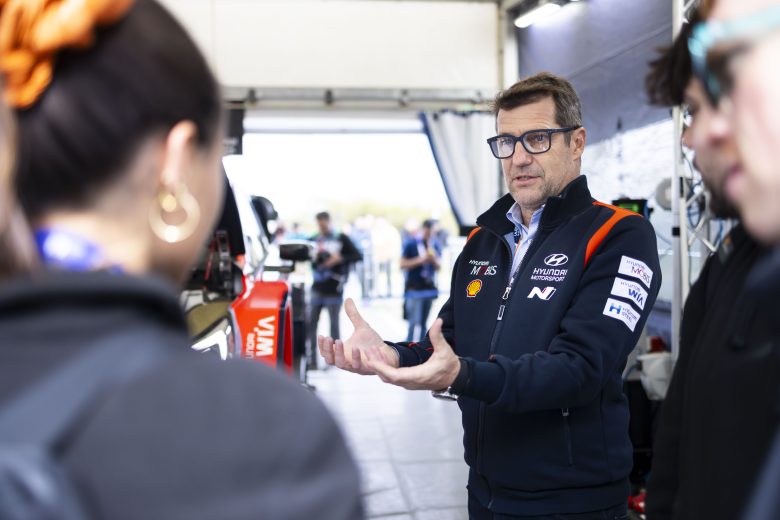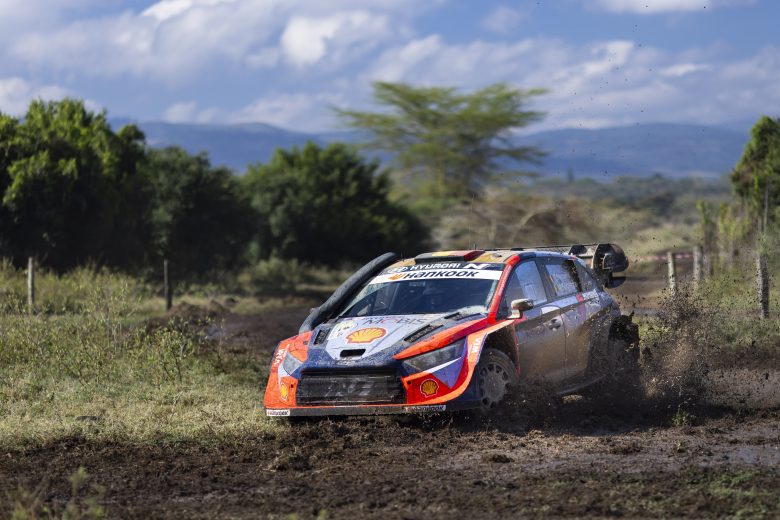Hyundai will not commit to the 2027 World Rally Championship regulations without revisions from the FIA.
Talking to DirtFish, Hyundai Motorsport technical director François-Xavier Demaison outlined the Korean manufacturer’s position, with future plans for the powertrain his primary concern.
“We would like to build a car for the future,” Demaison said. “But we’re not fully happy with the 2027 rules.
“I mean with the current [proposed 2027] rules, it’s difficult for us to make any decision. A full ICE (Internal Combustion Engine) car is not really what a manufacturer like Hyundai is ready to promote through rally.”
The next homologation cycle – labelled WRC27 – is set to replace Rally1 at the end of next season. The new cars, expected to be built to a cost cap of €345,000, will maintain the space frame chassis with bodywork design rules to be finalized by August.

While the governing body stipulates sustainably fuelled internal combustion only from the start of 2027, the next generation will eventually introduce alternative powertrains, including hybrid and full EV.
“[Drivetrain] is the main issue,” Demaison added. “I mean, the rest we are quite OK [with]. I think we all have to agree now that flexibility with the chassis and not having to start from, let’s say, a road car body shell, it gives more possibility and flexibility.
“I think we should try to have more diversity, that we don’t get the same cars, optimized just because of performance. So yes, we would be happy to see a bit different type of cars entering WRC and then, yeah, maybe a sort of equivalence of performance to allow everybody to be able to fight for wins.”
Asked if it would be possible for Hyundai to be involved in 2027 if ICE remains the sole powertrain option, Demaison offered: “Another problem is ’27 is too early for us. I mean, not only for us.
“This car is a cost-cap controled car, which means the validation, the design process is much longer for this type of car. You design a car for full performance, but you also have to integrate the cost. And you normally do a few loops of design to get within the cost.

Powertrain, and lack of time to prepare a new car, are concerns for Demaison
“Let’s say you define a budget for parts and you have to find a solution, and this takes time. So we don’t have the time now to design and build this car and test it sufficiently to start a five-year homologation period.
“I think it’s now becoming… it’s crazy to start a long cycle of homologation without proper testing and validation.”
So what would Hyundai want instead?
“We want more technology on the powertrain, and even more on the rest of the car, but it needs to be more than just a basic ICE car,” Demaison reiterated.
“It’s difficult to ask Korean bosses to invest a lot of money in a championship where you can’t promote anything. Promoting your road car and your technology is something very important for Hyundai.
“We’ll not make any decision before we know where the WRC is going. So if the FIA believes that it’s important to have Hyundai in the boat [they need to change something].”
WRC Promoter senior director sport, Peter Thul, is however optimistic Hyundai will remain in the service park.
“I can only say, not talking about the details, that everybody is talking to each other and every idea is on the table – and the discussions are good,” Thul said.
“I’m confident. I cannot speak on behalf of Hyundai what they are planning for the next years. But again, I’m confident.”
The FIA’s view
The FIA fully intends to address Hyundai’s powertrain concerns, but not by 2027.
FIA chief technical officer, Xavier Mestelan Pinon, said: “First, we have the regulation. It will be pure ICE. At a certain point, we will open the regulation for other kinds of products as it is written in the [2027] regulation, what we call the flexibility.
“I’m not sure that a lot of people can tell me who will be the future in five years regarding ICE, hybrid, EV. So our duty is to build a regulation for the long term.
“Everybody’s asking for that. If after five years we need to make some adaptation, we can.
“But today, I cannot tell you when we will open the regulation to hybrid, EV, or whatever you want.”
Mestelan Pinon explained why the FIA sees ICE as the best short-term solution, and argued that if manufacturers want to run electric cars there are other FIA world championships for that.

The WRC's short term future is in internal combustion
“Today, what we need to maximize in the rally is the show. So clearly, this is why we consider that ICE for the short term. It’s the best choice,” he added.
“If some manufacturer wants to promote their EV technology, hybrid, hydrogen, we have other championships for that. The FIA portfolio in terms of championship is very wide. So today, we consider that the future of the rally is pure ICE.
“If you are a manufacturer and you want to promote hydrogen, you know you can use Extreme H, or WEC for the future. You want to promote EV, you have Formula E.
“Now we also know that it’s tricky for all our manufacturers, and especially for us also, to know what will be the future for automotive. So we need to anticipate that. So this is why the new regulation is already set up so that it will be possible to put a battery inside the tubular frame, or hydrogen, or just a hybrid.
“Because we just need to anticipate the future, which is already more or less impossible to define. So we want to offer this flexibility in the future.”





